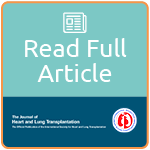Summary
The use of Ventricular Assist Devices (VADs) has significantly improved the management of advanced heart failure in children over the past 20 years, increasing access, expanding indications, and reducing adverse events. Nearly one-third of pediatric heart transplant recipients in the U.S. are now bridged to transplant with VADs.
The Advanced Cardiac Therapies Improving Outcomes Network (ACTION), established in 2017, plays a crucial role in improving pediatric VAD care through collaborative learning, real-world data collection, and quality improvement initiatives. Despite these advancements, pediatric VAD development faces significant regulatory and financial barriers, leading to frequent off-label use of adult devices.
ACTION has successfully addressed some of these challenges by:
-
Using real-world data (RWD) for regulatory submissions, including post-approval studies.
-
Supporting pediatric labeling of adult VADs, such as the HeartMate 3, which received FDA approval for pediatric use in 2020.
-
Facilitating post-market surveillance for devices like the Berlin Heart EXCOR, the only FDA-approved pediatric VAD.
-
Running a cost-effective clinical trial for the Berlin Heart Active Driver, accelerating approvals and reducing costs by 30–50%.
By streamlining regulatory processes and fostering collaboration, ACTION serves as a model for advancing pediatric medical devices beyond VADs.
This ACTION study was published by The Journal of Heart and Lung Transplantation in Volume 44 (Issue 4) in April 2025. Congratulations to the authors:
- Deepa Mokshagundam, MD
- David N. Rosenthal, MD
- Lauren Smyth, MHA
- Angela Lorts MD, MBA
CITATION
Mokshagundam D, Rosenthal D, et al. Bridging gaps in pediatric device development: The power of ACTION – a collaborative learning network. The Journal of Heart and Lung Transplantation. Volume 44, Issue 4, 2025, Pages 541-544. ISSN 1053-2498. https://doi.org/10.1016/j.healun.2024.12.018.

